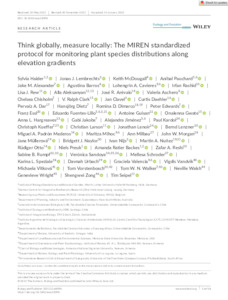Haider, Sylvia and Lembrechts, Jonas J. and McDougall, Keith and Pauchard, Aníbal and Alexander, Jake M. and Barros, Agustina and Cavieres, Lohengrin A. and Rashid, Irfan and Rew, Lisa J. and Aleksanyan, Alla and Arévalo, José R. and Aschero, Valeria and Chisholm, Chelsea and Clark, V. Ralph and Clavel, Jan and Daehler, Curtis and Dar, Pervaiz A. and Dietz, Hansjörg and Dimarco, Romina D. and Edwards, Peter and Essl, Franz and Fuentes‐Lillo, Eduardo and Guisan, Antoine and Gwate, Onalenna and Hargreaves, Anna L. and Jakobs, Gabi and Jiménez, Alejandra and Kardol, Paul and Kueffer, Christoph and Larson, Christian and Lenoir, Jonathan and Lenzner, Bernd and Padrón Mederos, Miguel A. and Mihoc, Maritza and Milbau, Ann and Morgan, John W. and Müllerová, Jana and Naylor, Bridgett J. and Nijs, Ivan and Nuñez, Martin A. and Otto, Rüdiger and Preuk, Niels and Ratier Backes, Amanda and Reshi, Zafar A. and Rumpf, Sabine B. and Sandoya, Verónica and Schroder, Mellesa and Speziale, Karina L. and Urbach, Davnah and Valencia, Graciela and Vandvik, Vigdis and Vitková, Michaela and Vorstenbosch, Tom and Walker, Tom W. N. and Walsh, Neville and Wright, Genevieve and Zong, Shengwei and Seipel, Tim.
(2022)
Think globally, measure locally: The MIREN standardized protocol for monitoring plant species distributions along elevation gradients.
Ecology and Evolution, 12 (2).
e8590.
![[img]](https://edoc.unibas.ch/style/images/fileicons/application_pdf.png)  Preview |
|
PDF
- Published Version
Available under License CC BY (Attribution).
2223Kb |
Official URL: https://edoc.unibas.ch/87924/
Downloads: Statistics Overview
Abstract
Climate change and other global change drivers threaten plant diversity in mountains worldwide. A widely documented response to such environmental modifications is for plant species to change their elevational ranges. Range shifts are often idiosyncratic and difficult to generalize, partly due to variation in sampling methods. There is thus a need for a standardized monitoring strategy that can be applied across mountain regions to assess distribution changes and community turnover of native and non‐native plant species over space and time. Here, we present a conceptually intuitive and standardized protocol developed by the Mountain Invasion Research Network (MIREN) to systematically quantify global patterns of native and non‐native species distributions along elevation gradients and shifts arising from interactive effects of climate change and human disturbance. Usually repeated every five years, surveys consist of 20 sample sites located at equal elevation increments along three replicate roads per sampling region. At each site, three plots extend from the side of a mountain road into surrounding natural vegetation. The protocol has been successfully used in 18 regions worldwide from 2007 to present. Analyses of one point in time already generated some salient results, and revealed region‐specific elevational patterns of native plant species richness, but a globally consistent elevational decline in non‐native species richness. Non‐native plants were also more abundant directly adjacent to road edges, suggesting that disturbed roadsides serve as a vector for invasions into mountains. From the upcoming analyses of time series, even more exciting results can be expected, especially about range shifts. Implementing the protocol in more mountain regions globally would help to generate a more complete picture of how global change alters species distributions. This would inform conservation policy in mountain ecosystems, where some conservation policies remain poorly implemented. We summarize the findings achieved with the standardized sampling protocol developed by the Mountain Invasion Research Network (MIREN) for monitoring the impact of global change on elevational plant species distributions. We intend to promote the use of the protocol to generate global insights into native and non‐native species responses to rapid global change in mountains.
| Faculties and Departments: | 05 Faculty of Science > Departement Umweltwissenschaften > Integrative Biologie > Ökologie (Rumpf) |
|---|
| UniBasel Contributors: | Rumpf, Sabine |
|---|
| Item Type: | Article, refereed |
|---|
| Article Subtype: | Research Article |
|---|
| Publisher: | Wiley |
|---|
| e-ISSN: | 2045-7758 |
|---|
| Note: | Publication type according to Uni Basel Research Database: Journal article |
|---|
| Language: | English |
|---|
| Identification Number: | |
|---|
| edoc DOI: | |
|---|
| Last Modified: | 17 Jun 2022 13:50 |
|---|
| Deposited On: | 07 Mar 2022 06:48 |
|---|
Repository Staff Only: item control page


